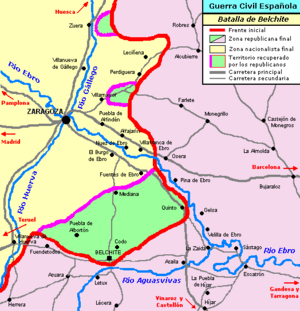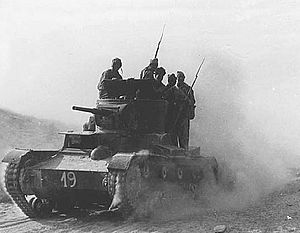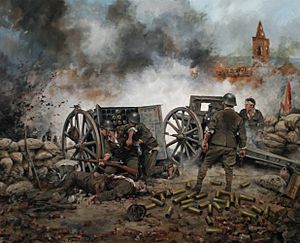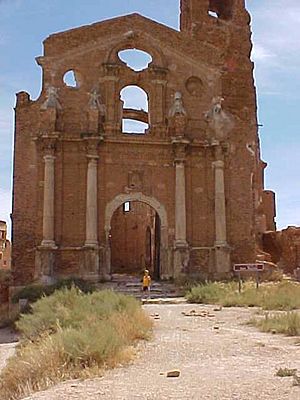Battle of Belchite (1937) facts for kids
Quick facts for kids Battle of Belchite |
|||||||
|---|---|---|---|---|---|---|---|
| Part of the Spanish Civil War | |||||||
 Progress of the Battle of Belchite with initial and final situations shown. |
|||||||
|
|||||||
| Belligerents | |||||||
|
|
|||||||
| Commanders and leaders | |||||||
| Enrique Líster Vicente Rojo Lluch |
Alfonso Trallero † | ||||||
| Strength | |||||||
| 80,000 infantry 105 tanks 90 aircraft |
5,000–10,000 infantry | ||||||
| Casualties and losses | |||||||
| 2,800 killed 6,000 wounded |
2,000 killed 600 wounded 2,411 taken prisoner |
||||||
The Battle of Belchite was a series of military fights that happened in and around the small town of Belchite, in Aragon, Spain. These battles took place between August 24 and September 7, 1937, during the Spanish Civil War. It was a significant event where the Republican army tried to stop the Nationalist forces.
Contents
Why the Battle Happened
After some earlier battles didn't go as planned, the leaders of the Republican army decided to try new attacks. Their goal was to slow down the Nationalist forces who were moving quickly in the north of Spain. So, they planned a new campaign in the Aragon region.
This decision was made for both military and political reasons. The government wanted to reduce the power of certain political groups in the area. They also aimed to capture Zaragoza, which was the capital city of Aragon. Zaragoza was very important because it was a communication hub for the entire front line in Aragon. Controlling key towns was more important than controlling large open areas during this part of the war. The Nationalist forces had fewer soldiers spread out, mostly in towns.
The Republican generals planned to attack at several points along a 100-kilometer stretch of the front. They hoped this would make it harder for the Nationalists to counter-attack and would also make their own forces less of a target for enemy planes.
Republican Army Attacks

The Republican Army of the East, along with soldiers from the International Brigades (who were volunteers from other countries), began their attack. They had about 80,000 soldiers, 105 T-26 tanks, and 90 airplanes. They attacked in several directions between Zuera and Belchite.
In some areas, the Republican forces managed to take control of empty land easily. They quickly captured the village of Mediana and then Quinto. However, they faced very strong resistance in the village of Codo, where a small group of Nationalist soldiers held off two Republican brigades.
The toughest fight was in Belchite itself. About 7,000 Nationalist defenders fought bravely for a long time, even though they were surrounded. The Republicans finally took Belchite on September 7. These delays gave the Nationalist forces time to bring in more soldiers and supplies. Because of this, the larger plan to capture Zaragoza did not succeed.
Nationalist Counter-Attack

The Nationalist forces launched their own counter-attack from August 30 to September 6. They used five divisions of soldiers, artillery, and 65 airplanes. Their main success was shooting down five Republican planes. However, they were not able to break through the Republican lines.
What Happened After
Even though the Republican army had some early success and pushed the front line about ten kilometers deeper into Nationalist territory, their main goals were not achieved. The Nationalists did not delay their big attack in the north, and the attempt to capture Zaragoza failed.
Belchite: A War Monument
The town of Belchite was completely destroyed during the battle. After the war, General Franco, the leader of the Nationalist side, ordered that the ruins be left as they were. He wanted them to be a "living" reminder of the war. A new town was built right next to the old, ruined one. You can still visit the old town and see the holes and caves on Lobo Hill where the Republican artillery was placed.
See also
 In Spanish: Batalla de Belchite para niños
In Spanish: Batalla de Belchite para niños
 | Valerie Thomas |
 | Frederick McKinley Jones |
 | George Edward Alcorn Jr. |
 | Thomas Mensah |


